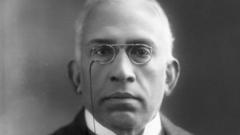Who Was the Indian Who Exposed a Massacre and Defied the British Empire?

The Defiant Voice of Sir Chettur Sankaran Nair: A Legacy of Courage and Reform
Long before India gained independence from British rule, there existed a unique voice that dared to challenge the atrocities of colonial governance. Sir Chettur Sankaran Nair, a prominent lawyer and statesman, made his mark as one of the few Indians appointed to high-ranking government positions during the British Raj. His courageous resignation from the Viceroy's Council following the infamous Jallianwala Bagh massacre in 1919 not only highlighted his moral integrity but also transformed him into a symbol of resistance. This article dives deep into the life and legacy of Nair, exploring his contributions to Indian society, his role in the independence movement, and the lasting impact of his actions on the struggle for freedom.
Early Life and Education
Born in 1857 into a wealthy family in what is now Palakkad district in Kerala, Nair was exposed to the issues of his time from an early age. He pursued higher education at the prestigious Presidency College in Madras, where he earned a bachelor's degree. His academic endeavors laid the groundwork for his legal career, which began with an apprenticeship under a judge at the Madras High Court.
In 1887, Nair joined the social reform movement in the Madras presidency, advocating for significant changes in Hindu laws regarding marriage and women's rights. He emerged as a powerful voice against the caste system, positioning himself as a champion of social justice long before it became a widespread movement in India.
Political Engagement and Early Career
Nair's political journey began with his involvement in the Indian National Congress, where he served as a delegate and presided over its session in Amraoti (Amravati) in 1897. During his address, he boldly held the British government accountable for the extreme poverty ravaging the masses, asserting that the annual famines were more devastating than under any "civilized" government globally.
His career continued to flourish as he assumed the role of public prosecutor in 1899. An influential figure, Nair often advised the government on how to handle seditious articles in newspapers, successfully protecting many writers, including his close friend G. Subramania Iyer, the first editor of The Hindu newspaper.
By 1908, Nair had ascended to the position of high court judge, and four years later, he was knighted, a recognition of his contributions to the legal field and society at large. However, Nair's real influence emerged when he was appointed a member of the Viceroy's Council in 1915, becoming only the third Indian to hold such a position.
The Jallianwala Bagh Massacre: A Turning Point
The turning point in Nair's life came with the tragic events of the Jallianwala Bagh massacre on April 13, 1919. On this day, British troops, under the command of Brigadier General R.E.H. Dyer, opened fire on a large gathering of unarmed Indians in Amritsar, resulting in the death of hundreds and injuring more than a thousand. Official estimates reported around 400 casualties, while Indian sources claimed the number was closer to 1,000.
Deeply disturbed by the massacre, Nair voiced his outrage in his writings. In his 1922 book, *Gandhi and Anarchy*, he expressed his apprehension about the increasing violence and oppression in Punjab, stating, "If to govern the country, it is necessary that innocent persons should be slaughtered at Jallianwala Bagh... the country is not worth living in." His words reflected the sentiments of many Indians who were disillusioned by British rule.
Resignation and Advocacy in Britain
Following the massacre, Nair resigned from the Viceroy's Council in May 1919, a bold move that demonstrated his commitment to justice. He traveled to Britain to galvanize public opinion against the atrocities committed by the British government in India. Nair's efforts bore fruit when he engaged with the press, leading to widespread coverage of the Jallianwala Bagh massacre in prominent publications like *The Westminster Gazette* and *The Times*.
In his memoir, Nair expressed satisfaction at having brought attention to the massacre, stating, "Worse things had happened under British rule, but I am glad I was able to obtain publicity for this one at least." His endeavors in Britain significantly contributed to raising awareness of colonial brutality, igniting a sense of urgency within the Indian independence movement.
The Libel Case Against Sir Michael O’Dwyer
Nair's indomitable spirit was put to the test when he published *Gandhi and Anarchy*, which criticized Mahatma Gandhi's civil disobedience movement and denounced the actions of Sir Michael O'Dwyer, the then Lieutenant Governor of Punjab. Nair held O'Dwyer accountable for the violence perpetuated by the British authorities prior to the imposition of martial law. As a result, O'Dwyer launched a libel case against Nair in 1924.
The five-week trial in the Court of King's Bench in London ended unfavorably for Nair, with the jury ruling 11:1 in favor of O'Dwyer, ordering Nair to pay £500 in damages and an additional £7,000 in costs. Despite the loss, Nair's case succeeded in bringing the atrocities of Jallianwala Bagh to the forefront, further fueling the fire of the independence movement.
Nair's great-grandson, Raghu Palat, notes that the case sparked an uproar for the freedom movement, emphasizing that it highlighted the unfair treatment of Indians under British rule. Even Mahatma Gandhi, who had a complicated relationship with Nair, acknowledged his bravery in fighting a seemingly hopeless battle.
Later Life and Contributions
After the libel case, Nair returned to India, continuing to play an influential role in the political landscape. He served as the chairman of the Indian Committee of the Simon Commission in 1928, which reviewed constitutional reforms in India. His commitment to advocating for India's rights remained steadfast until his death in 1934 at the age of 77.
Nair's legacy is one of courage, reform, and an unwavering quest for justice. K.P.S. Menon, India's first foreign secretary, described him as a controversial figure whose independent views and disdain for extremist politics set him apart. Menon noted that Nair dedicated his life to the emancipation of his country from foreign domination and oppressive customs, achieving a remarkable degree of success through constitutional methods.
The Legacy of Sir Chettur Sankaran Nair
Though Sir Chettur Sankaran Nair may not be a household name in contemporary India, his contributions to the fight for independence and social reform resonate through history. His life serves as a testament to the power of dissent and the importance of standing up against injustice. The release of the Bollywood film *Kesari Chapter 2*, featuring Akshay Kumar, has rekindled interest in Nair's life and legacy, reminding new generations of the sacrifices made by individuals who fought for the rights of their fellow countrymen.
As we reflect on the life of Sir Chettur Sankaran Nair, it becomes evident that his unwavering courage and principled stance against colonial oppression make him a crucial figure in India's history. His story encourages us to recognize the importance of standing up for justice and the rights of others, regardless of the challenges we may face.
Frequently Asked Questions
Who was Sir Chettur Sankaran Nair?
Sir Chettur Sankaran Nair was an influential lawyer and statesman during the British Raj in India, known for his courageous criticism of colonial rule and his resignation from the Viceroy's Council following the Jallianwala Bagh massacre in 1919.
What was the Jallianwala Bagh massacre?
The Jallianwala Bagh massacre occurred on April 13, 1919, when British troops opened fire on a large gathering of unarmed Indians in Amritsar, resulting in hundreds of deaths and injuries. It remains one of the most tragic events in India's struggle for independence.
What impact did Nair's actions have on the Indian independence movement?
Nair's resignation from the Viceroy's Council and his efforts to raise awareness of the Jallianwala Bagh massacre garnered significant attention and contributed to the growing momentum of the Indian independence movement. His libel case against Sir Michael O'Dwyer also highlighted the injustices faced by Indians under colonial rule.
How did Nair view Mahatma Gandhi's civil disobedience movement?
Nair criticized Gandhi's civil disobedience movement in his book *Gandhi and Anarchy*, describing it as a "weapon to be used when constitutional methods have failed." His views were controversial, as he believed in pursuing reform through constitutional means.
What is Nair’s legacy today?
Sir Chettur Sankaran Nair's legacy is one of courage and reform. His commitment to justice and social change continues to inspire individuals in India and beyond. His story emphasizes the importance of standing up against oppression and advocating for the rights of all.
As we contemplate the sacrifices made by leaders like Sir Chettur Sankaran Nair, it is essential to recognize the ongoing struggle for justice and equality around the world. How can we apply the lessons from Nair's life to advocate for change in our own communities? #SirChetturSankaranNair #IndianIndependence #JusticeAndReform
Published: 2025-06-20 00:42:16 | Category: technology



